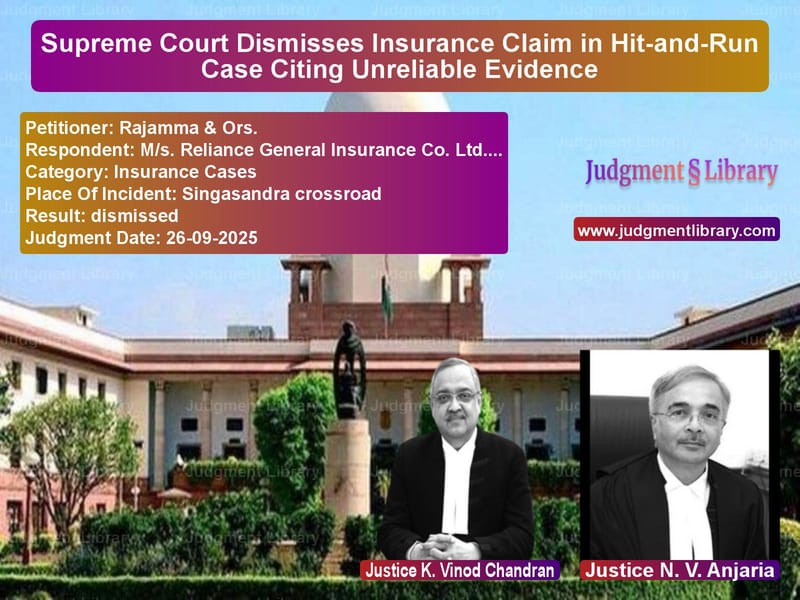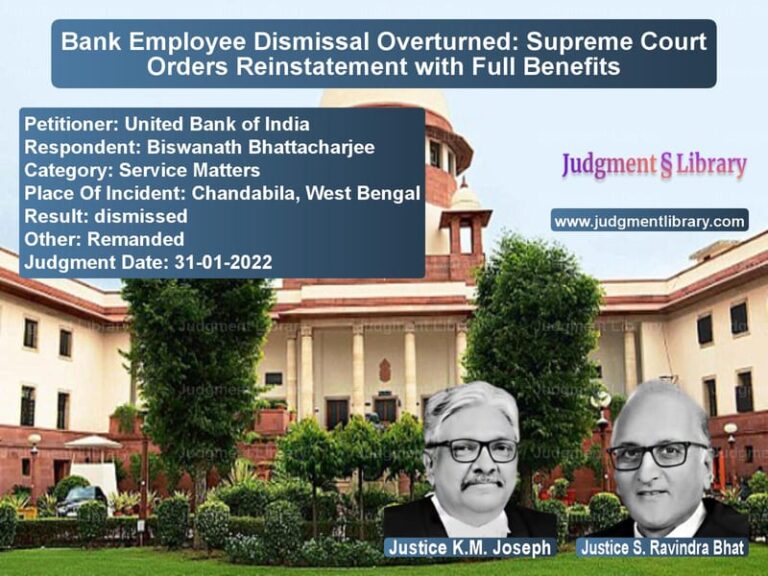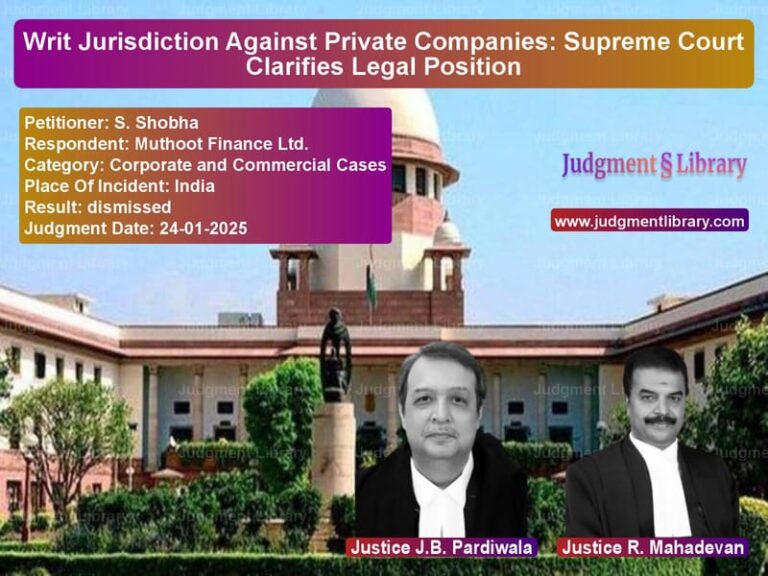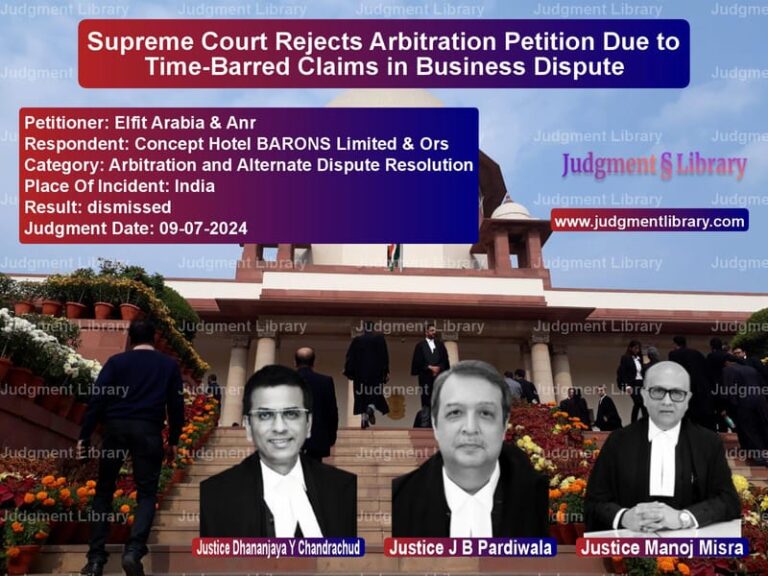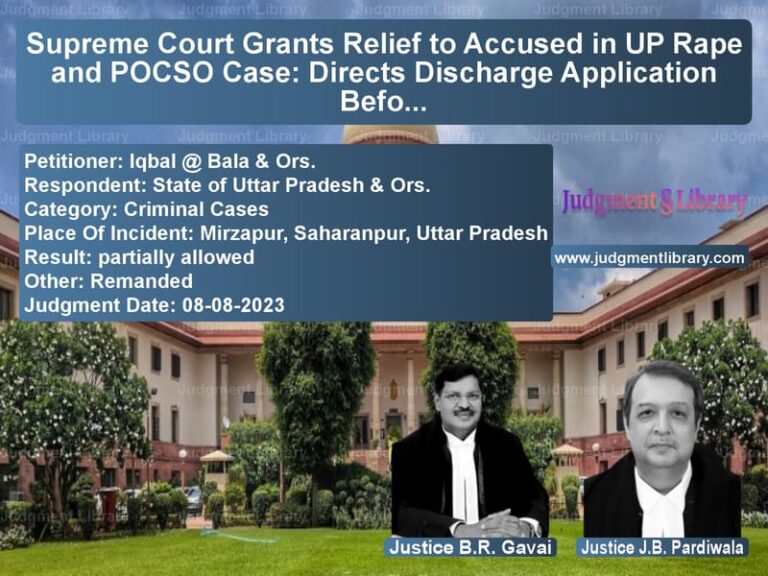Supreme Court Dismisses Insurance Claim in Hit-and-Run Case Citing Unreliable Evidence
In a recent judgment that highlights the importance of credible evidence in insurance claims, the Supreme Court of India upheld the decision of the High Court to deny compensation to the family of a man who allegedly died in a hit-and-run accident. The case, which involved multiple layers of investigation and legal scrutiny, ultimately turned on the reliability of witness testimony and documentary evidence.
The appellants in this case were Rajamma and others, the family members of the deceased victim. They claimed that the sole breadwinner of their family died in a road accident witnessed by a neighbor. According to their version of events, the driver of the offending vehicle abandoned the victim’s body after promising to take him to a hospital.
The respondents, M/s. Reliance General Insurance Co. Ltd., contested the claim, arguing that the alleged offending vehicle was not involved in any accident and that the claimants had fabricated the story to receive insurance compensation.
The Tribunal’s Initial Decision
The Motor Accidents Claims Tribunal initially ruled in favor of the claimants, awarding them Rs. 16,02,000. The Tribunal noted that the insurance company had failed to provide rebuttal evidence against the testimony of PW2, the eyewitness. The Tribunal stated: “there was no rebuttal evidence brought in by the insurance company as against the testimony of PW2, the eyewitness.”
The Tribunal further criticized the insurance company for not examining the driver of the alleged offending vehicle and dismissed concerns about the delay in FIR registration, attributing it to the case being initially filed at a police station without jurisdiction.
The High Court’s Reversal
The insurance company appealed to the High Court, which reversed the Tribunal’s decision. The High Court found that the accident and the involvement of the vehicle had not been satisfactorily proven. The Court listed multiple reasons for rejecting the claim application, pointing to inconsistencies in the evidence presented.
Supreme Court’s Analysis
The Supreme Court, comprising Justices K. Vinod Chandran and N. V. Anjaria, carefully examined the evidence and arguments presented by both sides. The Court noted several critical issues that undermined the claimants’ case.
Regarding the FIR registration, the Court observed: “If the FIR is registered on the basis of the accident or on the detection of the abandoned body, then it should have been registered in a Police Station having jurisdiction over either of the two locations.” The Court found it suspicious that the FIR was initially registered at Hebbogodi Police Station, which lacked jurisdiction, and was transferred to the jurisdictional Electronic City Traffic Police Station after 117 days, with no explanation for this delay.
The Court emphasized the standard of proof in motor accident cases: “It is on preponderance of probabilities that the proof of accident is looked at in a motor accidents claim.” However, the Court clarified that this standard doesn’t apply when there are valid suspicions about the authenticity of the claim: “the preponderance of probabilities that arise from such an FIR registered would not have the same probity if there is a valid suspicion raised on the registration of the FIR and the falsity of the claim being clearly discernible from the evidence led itself.”
Unreliable Witness Testimony
The Court found the testimony of PW2, the key eyewitness, to be untrustworthy. PW2 claimed to run a fruit shop near the accident scene but provided no documentation to support this claim, making her a “chance witness” whose testimony required strict scrutiny.
More importantly, the Court identified contradictions in her testimony: “she deposed in her chief examination, the vehicle had disappeared and so had the victim. However, she also stated in chief examination that the number of the vehicle was noted by herself and the daughter of the victim.” The Court found this contradiction significant, questioning how they could have noted the vehicle number if both the vehicle and victim had disappeared by the time she returned with the victim’s daughter.
The Court also noted that the victim’s daughter, who allegedly witnessed the vehicle number, was never examined, further weakening the claimants’ case.
Additional Factors Considered
The Supreme Court agreed with most of the High Court’s reasoning, except for the issue of the time mentioned in the complaint, which the Supreme Court considered possibly a typographical error (12 am instead of 12 pm).
The Court also noted that in the related criminal case, the driver of the vehicle had been acquitted, and PW2 (who appeared as PW4 in the criminal case) failed to identify the driver. This further undermined the credibility of the witness and the overall claim.
Final Ruling
After thorough examination of all evidence and arguments, the Supreme Court concluded: “We find absolutely no reason to interfere in the appeal and the same is dismissed.”
The judgment underscores the judiciary’s commitment to scrutinizing evidence carefully in insurance claims, particularly when there are indications of potential fraud or fabrication. While the outcome may seem harsh to the claimants, the Court emphasized the importance of establishing claims through reliable and consistent evidence.
This case serves as an important precedent for future insurance claim disputes, highlighting that the principle of “preponderance of probabilities” has its limits when fundamental aspects of a claim lack credibility or contain irreconcilable contradictions.
Petitioner Name: Rajamma & Ors..Respondent Name: M/s. Reliance General Insurance Co. Ltd. & Anr..Judgment By: Justice K. Vinod Chandran, Justice N. V. Anjaria.Place Of Incident: Singasandra crossroad.Judgment Date: 26-09-2025.Result: dismissed.
Don’t miss out on the full details! Download the complete judgment in PDF format below and gain valuable insights instantly!
Download Judgment: rajamma-&-ors.-vs-ms.-reliance-genera-supreme-court-of-india-judgment-dated-26-09-2025.pdf
Directly Download Judgment: Directly download this Judgment
See all petitions in Motor Insurance Settlements
See all petitions in Third-Party Insurance
See all petitions in Insurance Settlements
See all petitions in Hit and Run Cases
See all petitions in Compensation Disputes
See all petitions in Judgment by K. Vinod Chandran
See all petitions in Judgment by N.V. Anjaria
See all petitions in dismissed
See all petitions in supreme court of India judgments September 2025
See all petitions in 2025 judgments
See all posts in Insurance Cases Category
See all allowed petitions in Insurance Cases Category
See all Dismissed petitions in Insurance Cases Category
See all partially allowed petitions in Insurance Cases Category

